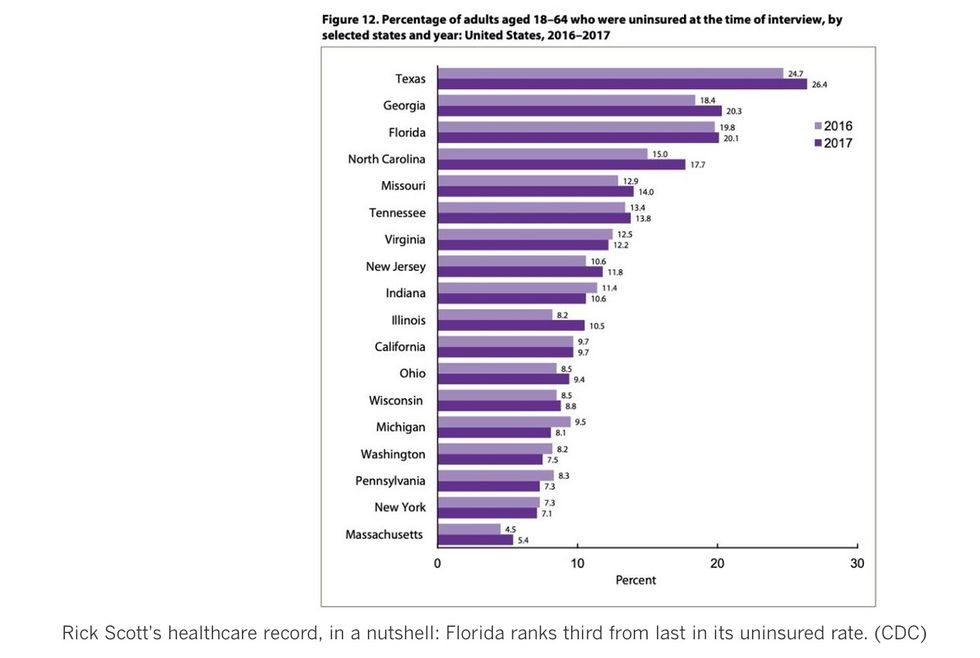The hallmark of the Trump administration is its quest to put exactly the wrong people in charge of agencies and policies. But his designation of Sen. Rick Scott (R-Fla.) as his point man on healthcare goes well over the line into self-parody.
Put simply, one could not find a worse figurehead for a push on improving healthcare than Rick Scott. As Florida's governor, he presided over an epic decline in the state's insurance coverage rate. He refused to accept Medicaid expansion under the Affordable Care Act, depriving 1.4 million residents of coverage they would have received with the change.Scott presents himself as a healthcare expert. He boasts: "I ran one of the largest healthcare companies in the world."
“That company is Columbia/HCA, which Scott ran until 1997. He left just months after the federal government announced a sprawling investigation into whether the company had systematically defrauded Medicare, Medicaid and other government healthcare programs.
That investigation concluded with what the Justice Department called the "largest government fraud settlement in U.S. history." Columbia/HCA and several subsidiaries ultimately pleaded guilty to 14 criminal counts. The company paid $840 million in fines and penalties. The government tacked on an additional $881 in penalties in 2003, bringing the total to more than $1.7 billion, which the Justice Department said was "by far the largest recovery ever reached by the government in a health care fraud investigation."
This is the guy Trump says will make the Republican Party "the party of healthcare." In naming Scott, along with Sens. John Barrasso (R-Wyo.) and Bill Cassidy (R-La.) as his flying wedge on the topic, Trump promised, "They are going to come up with something really spectacular."Trump made his remarks in an effort to tamp down outrage over his decision to call for the federal courts to overturn the Affordable Care Act as unconstitutional. That policy decision emerged last week, when Trump's Justice Department said it would not defend any part of the ACA from a Republican challenge in federal court.
Trump tried to reassure the public that a replacement for the ACA would be ready if the courts overturned the law. Let's leave aside that the GOP hasn't managed to come up with a credible replacement in the nine years during which it has tried to repeal the law, and look at the healthcare records of Scott and his two confederates.
During Scott's eight years as Florida's governor, ending this year, Florida remained one of the sickest states in the union. Its uninsured rate among adults age 18-64 rose to 20.1% in 2017. According to the Centers for Disease Control and Prevention, that was the third-worst rate in the U.S.
The Commonwealth Fund, a healthcare think tank, ranked Florida third worst in overall health metrics (48th out of the 50 states and District of Columbia). The state ranked 49th in measures of access and affordability of healthcare, prevention and treatment, avoidable hospital use and cost, and disparity in care between high- and low-income residents.
One major reason for this record is Scott's refusal to expand Medicaid. He even rejected a 2015 proposal that would have covered 800,000 Floridians, albeit with the imposition of work requirements and co-pays.

Notwithstanding Scott's "expertise," he mumbled and fumbled under questioningSunday by Margaret Brennan on CBS' "Face the Nation." He seemed to be under the impression that Trump would propose a healthcare plan, though Trump dumped the matter in his lap. Amazingly, he repeated, "I ran a large hospital company," even though the company was guilty of fraud.
Asked if a Republican alternative would "guarantee access to maternity care or care for newborn children? Mental health? Some of the things that are guaranteed in Obamacare," he dodged the question with a bland, "Well, of course."Would it, though?
One of the last GOP proposals for an ACA replacement was offered in 2017 by Cassidy, now Scott's partner in cooking up an alternative. That proposal would have cost untold millions of Americans their health coverage, according to the Congressional Budget Office. It would have weakened protections for people with preexisting conditions by giving states the authority to allow insurers to charge those customers higher premiums.
As for Barrasso, a colorless member of Senate Majority Leader Mitch McConnell's team, he voted at least twice against expanding health coverage for children, and backed former House Speaker Paul D. Ryan's budget proposal that would have undermined Medicare.
Ladies and gentlemen, your Republican healthcare team. Do you expect them to come up with "something really spectacular" as Trump promised? To ask the question is to answer it.
LA Times, April 1, 2019
Michael Hiltzik
Pulitzer Prize-winning journalist Michael Hiltzik writes a daily blog appearing on latimes.com. His business column appears in print every Sunday, and occasionally on other days. As a member of the Los Angeles Times staff, he has been a financial and technology writer and a foreign correspondent. He is the author of six books, including "Dealers of Lightning: Xerox PARC and the Dawn of the Computer Age" and "The New Deal: A Modern History." Hiltzik and colleague Chuck Philips shared the 1999 Pulitzer Prize for articles exposing corruption in the entertainment industry.
###
April 2, 2019
Voices4America Post Script. As Hiltzik wrote, Trump has also said the GOP will release its "spectacular" health care plan after the 2020 election. And now this! This is serious, folks. We need to beat them out Bigly2020 #PartyofNoHealthCare #StopTrump #StopGOP

